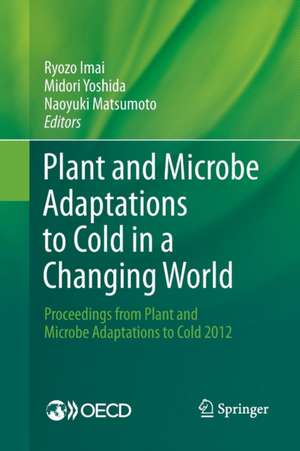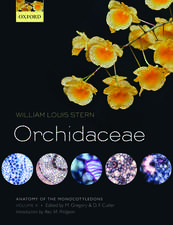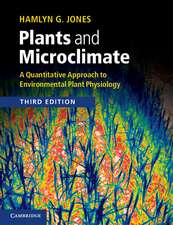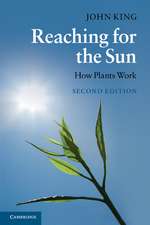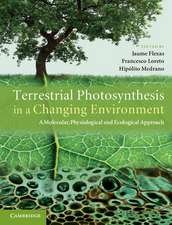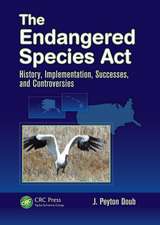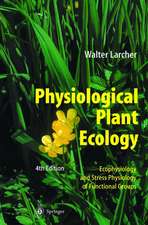Plant and Microbe Adaptations to Cold in a Changing World: Proceedings from Plant and Microbe Adaptations to Cold 2012
Editat de Ryozo Imai, Midori Yoshida, Naoyuki Matsumotoen Limba Engleză Paperback – 22 aug 2016
| Toate formatele și edițiile | Preț | Express |
|---|---|---|
| Paperback (1) | 1521.03 lei 6-8 săpt. | |
| Springer – 22 aug 2016 | 1521.03 lei 6-8 săpt. | |
| Hardback (1) | 1525.67 lei 6-8 săpt. | |
| Springer – 13 sep 2013 | 1525.67 lei 6-8 săpt. |
Preț: 1521.03 lei
Preț vechi: 1854.91 lei
-18% Nou
Puncte Express: 2282
Preț estimativ în valută:
291.25€ • 300.43$ • 241.39£
291.25€ • 300.43$ • 241.39£
Carte tipărită la comandă
Livrare economică 20 februarie-06 martie
Preluare comenzi: 021 569.72.76
Specificații
ISBN-13: 9781493953592
ISBN-10: 1493953591
Pagini: 371
Ilustrații: XIX, 352 p. 99 illus., 66 illus. in color.
Dimensiuni: 155 x 235 x 20 mm
Greutate: 0.52 kg
Ediția:Softcover reprint of the original 1st ed. 2013
Editura: Springer
Colecția Springer
Locul publicării:New York, NY, United States
ISBN-10: 1493953591
Pagini: 371
Ilustrații: XIX, 352 p. 99 illus., 66 illus. in color.
Dimensiuni: 155 x 235 x 20 mm
Greutate: 0.52 kg
Ediția:Softcover reprint of the original 1st ed. 2013
Editura: Springer
Colecția Springer
Locul publicării:New York, NY, United States
Cuprins
1. Global change in winter climate and agricultural sustainability.- 2. Soil freezing dynamics in a changing climate: implications for agriculture.- 3. Winter climate change and ecological implications in temperate systems.- 4. Possible change of water and nitrate cycles associated with the frost-depth decrease under climate change.- 5. Soil Frost Control: Its Application to Volunteer Potato Management in a Cold Region.- 6. Climatic and physiological background of ice encasement damage of herbage plants.- 7. NO, antioxidants and metabolites as key players in plant cold acclimation.- 8. The function and evolution of closely related COR/LEA (COld Regulated/Late Embryogenesis Abundant) proteins in Arabidopsis thaliana.- 9. 3D Reconstruction of Frozen Plant Tissue: a unique histological analysis to image post-freeze responses.- 10. Post-transcriptional and post-translational modifications controlling cold response.- 11. Cold shock domain proteins in Arabidopsis: functions in stress tolerance and development.- 12. Regulation of RNA metabolism in plant adaptation to cold.- 13. Protein Phosphorylation Network in Abscisic Acid Signaling.- 14. Using synchrotron FTIR and confocal cryomicroscopy to explore mechanisms of cold acclimation and freezing resistance using a single cell layer of Allium fistulosum L..- 15. Supercooling-Facilitating Hydrolyzable Tannins Isolated from Xylem Tissues of Cercidiphyllum japonicum.- 16. ICE1, a transcription factor involved in cold signaling and tolerance.- 17. Breeding for improved winter survival in forage grasses.- 18. Molecular changes in recurrently selected populations of forage legumes.- 19. Abiotic stress signal network with expression QTLs for cold-responsive genes in common wheat.- 20. Molecular analysis of fructan metabolism associated with freezing tolerance and snow mold resistance of winter wheat.- 21. Do growth kinetics of snow-mold fungi explain exponential CO2 fluxes through the snow?.- 22. Change in Snow Mold Florain Eastern Hokkaido and its Impact on Agriculture.- 23. Phytopathogenic fungi and fungal-like microbes in Svalbard.- 24. Ecological Strategies of Snow Molds to Tolerate Freezing Stress.- 25. Snow mold fungi in Russia.- 26. Snow moulds in a changing environment - a Scandinavian perspective.- 27. Mechanisms of snow mold resistance in wheat.- 28. Activating Disease Resistance in Turfgrasses Against Fungal Pathogens: Civitas and Harmonizer.
Notă biografică
Dr. Ryozo Imai Crop Breeding Research Division Hokkaido Agricultural Research Center, NARO Dr. Naoyuki Matsumoto Silviculture & Forest Ecology Studies Graduate School of Agriculture, Hokkaido University
Textul de pe ultima copertă
Global warming is affecting agriculture in a wide range of the climatic zones. In contrast to the extensive debate over the effects of global warming during summer growth, the impact of rising winter temperature on agricultural production has received considerably less attention. However, climate changes can certainly affect winter conditions, and small changes in winter climate can have even more drastic impacts in many regions of the world.
Plant and Microbe Adaptations to Cold (PMAC) is an interdisciplinary forum for research and extension scientists working in the fields of plant pathology, plant physiology, microbiology, and crop breeding, to advance our understanding of overwintering of crops and attempt to solve the problems associated with winter damage. PMAC2012 gathered over 100 participants from 14 countries and hosted 41 oral and 42 poster presentations.
This book is a collection of contributions from invited and selected speakers at the conference. Each contribution includes important and timely topics on plant and microbe adaptations to cold. These contributions span the topics discussed at the conference. Publication of this book has been partially supported by OECD-CRP.
Plant and Microbe Adaptations to Cold (PMAC) is an interdisciplinary forum for research and extension scientists working in the fields of plant pathology, plant physiology, microbiology, and crop breeding, to advance our understanding of overwintering of crops and attempt to solve the problems associated with winter damage. PMAC2012 gathered over 100 participants from 14 countries and hosted 41 oral and 42 poster presentations.
This book is a collection of contributions from invited and selected speakers at the conference. Each contribution includes important and timely topics on plant and microbe adaptations to cold. These contributions span the topics discussed at the conference. Publication of this book has been partially supported by OECD-CRP.
Caracteristici
Book includes papers from keynote lecture and oral presentations of Plant and Microbe Adaptations to Cold (PMAC) 2012 Covers topics such as global warming in agricultural environment, plant adaptations to cold, microbial adaptations to cold, plant-microbe interaction under cold, and molecular breeding for winter hardiness Experts in the field report cutting edge research and thoughtful strategies for sustainability Includes supplementary material: sn.pub/extras
